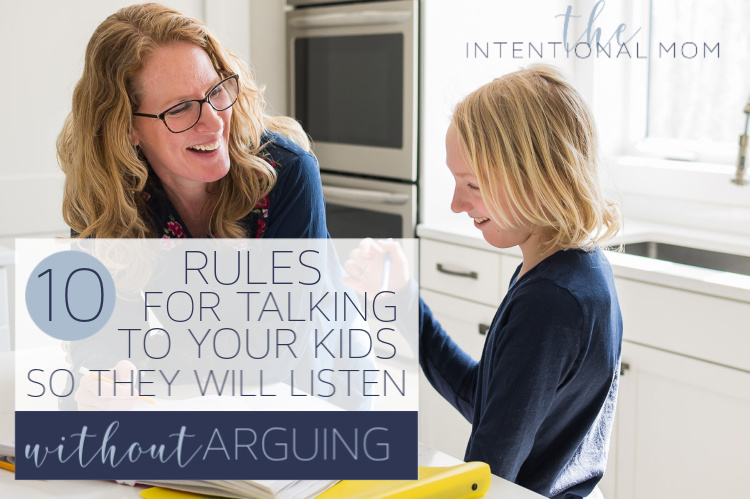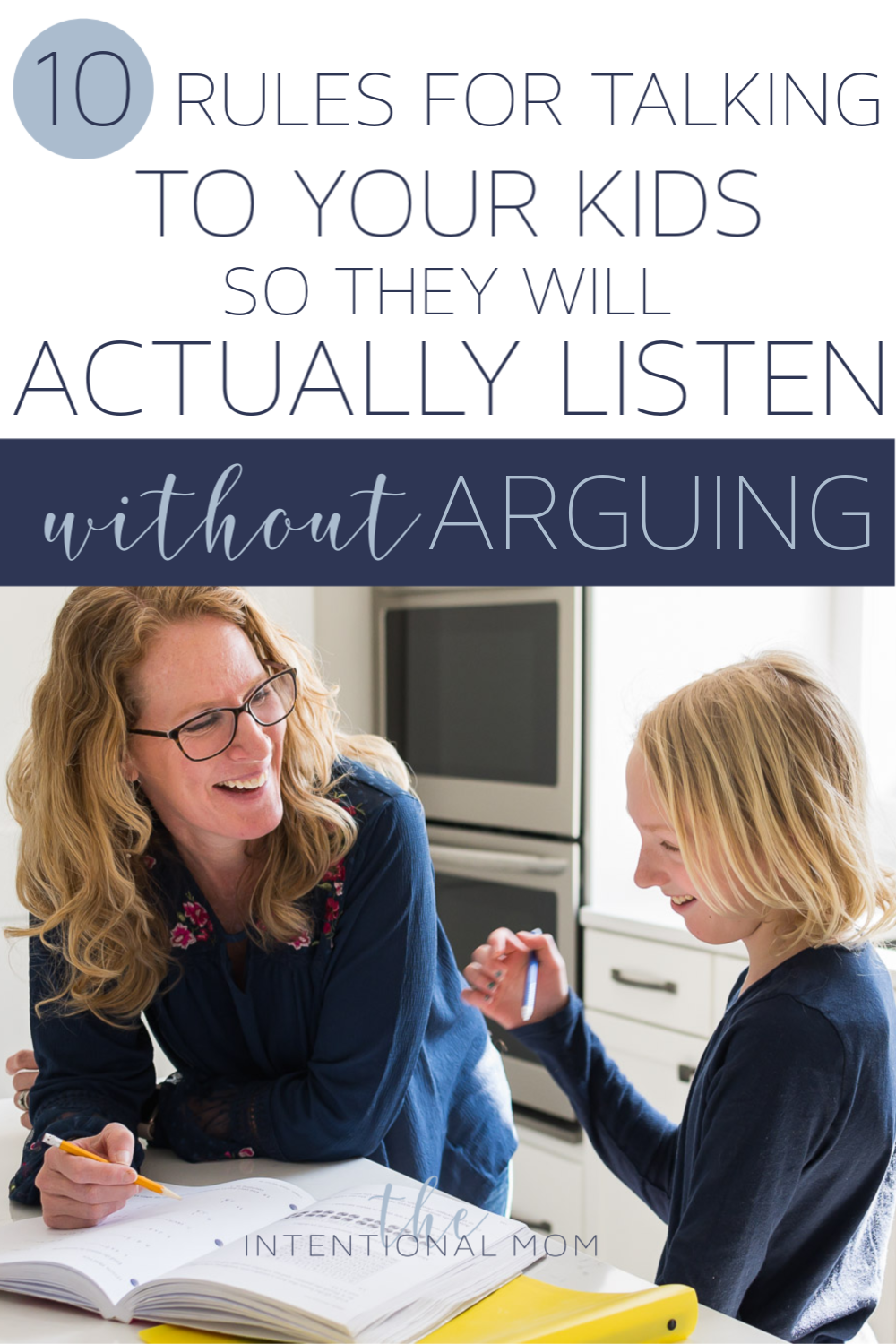10 Rules for Talking to Your Kids So They Will Listen Without Arguing
The Intentional Mom Planning System is where you need to start with our incredible collection of product options. It will help you establish the basics for your life & home so you’ll finally have a plan, save yourself time, and go to bed feeling like you accomplished something every day (because you did). Save up to 60% HERE!
We all talk to our kids, but do you know how to really communicate with them? Do you find yourself asking, “How do I talk to my kids so they will listen?” Maybe you’re tired of the arguing, the eye-rolling, and finding yourself yelling when you really didn’t intend (or want) to yell at all. As a mom of nine including three teens, I have come about these 10 rules through living life down in the trenches with them every day. Knowing how to talk with your kids doesn’t necessarily come easy, especially if you want them to really listen to you. But, when using this 10 rules for talking with your kids, it’s amazing how easy it really can be whether you’re trying to get your toddler to listen to you, your teenager to open up to you, or something in-between.
Before you go any further, be sure to grab our template for making house rules – they are essential in every family! Just tell us where to send yours!
[convertkit form=5156323]
Here’s the thing.
Talking with your kids so they will listen means you’re actually going to be communicating with your kids.
Here’s what doesn’t qualify as communicating with kids
- Talking at your kids
- Talking down to your kids
- Yelling at your kids
Now that you know a few of the things that don’t qualify as really talking to your kids, let’s keep going.
Talking to your kids so they will listen is possible!
As parents, one of our most important jobs is listening and communicating with our kids in a healthy way. Doing so will not only mean they are truly listening to you, but it will also equip your kids to do the same with the people in their lives.
After all, we have most likely all had to try to communicate with people who have no idea how to communicate with us as adults. This is so frustrating!
In many ways, effectively talking with our kids has respect at the root. Therefore, if you know you struggle with respecting with your kids, talking with your kids may be a bit more of a challenge as well.
There are other things that make talking to your kids a challenge. These could be things like:
- Having the same personality
- Having opposite personalities
- Psychological issues
- Additional stress
- And many more
But, there is hope!
As a mom of 9, these are the things I’ve come to learn. These rules really are simple, which doesn’t always mean easy. It takes some practice, but reading through this list on a regular basis will help. Be sure to pin this for later so you can find it!
These are the 10 rules for talking to your kids so they will listen without arguing.
(this post may contain affiliate links. If you make a purchase, I may receive a small commission at no cost to you)
1. Don’t talk to your kids without listening first
Yes, you are the parent and you are the adult. But, there are often things going on that you know nothing about. It’s so easy to just look at a behavior and assume that your child is to blame. When in reality, there may have been a catalyst that happened first.
In order to be able to effectively talk to your kids, you have to have all of the information, first.
And usually, the only way to get this is to ask and then listen.
So, when dealing with any kind of situation – even misbehavior or disobedience, always ask what your child has to say about it first.
Really, wouldn’t you like to be asked about something first?
2. Whether talking or listening, always look your kids in the eye
This can be so hard, especially when you’re busy. Multi-tasking can be a good thing. But, this is never a good idea when talking to anyone including your kids.
When communicating with anyone, they deserve your full attention. This simply requires looking them in the eye.
If you want your kids to listen, you will need to speak and listen while looking them in the eye.
3. Don’t interrupt – ever
This is so hard for me. I am so guilty of interrupting. I am a to the point kind of person, and there is nothing that bothers me more than someone taking “too long” to tell me something. Of course that only means too long in my book, not necessarily too long in theirs.
Even if you’re like me, proper communicating with anyone means you shouldn’t interrupt. It really boils down to respect.
4. No matter the subject matter, keep an open mind
This is part of showing respect as well. It’s amazing what you can find out if you actually listen – and if you keep an open mind.
Kids are pretty amazing, and I am often surprised at just how smart and reasonable they can be. But, I d have to keep an open mind in order to see this.
5. Speak to your kids in love – always
It can be hard to do this when you’re frustrated, tired, and stressed. I know, I know, when aren’t you that way as a mom! I feel this, too.
But, it does help to take a step back and pause before speaking if you know there are other things mixed into the equation when you’re talking to your kids.
6. Offer guidance, instruction & thoughts, not harsh criticism
I say it again, kids are smart. They have their own way of doing things. After all, they are their own people. This can be so hard to keep in mind when you really just want to make them do exactly what you want your kids to do.
But, they can often accomplish what you’re wanting them to accomplish in a different way.
As adults, they will have to be able to find their own way. And, this is nearly impossible to do in the face of criticism.
It’s so much better to offer wisdom, solid advice, and even just your thoughts rather than to list off all the ways your kid is “wrong.”
It’s so effective when talking to anyone to affirm them first. Build your kid up first, then offer your thoughts and advice.
7. Offer empathy, don’t minimize their feelings
No one likes to have their feelings dismissed. Even if you’re not in agreement, feelings are just part of being human. For this reason, feelings are never wrong.
At the root of most all communication is the desire to be understood. This can best be done by offering empathy when talking to your kids.
8. Talk to your kids when they are willing to talk
This is often when it isn’t convenient for you. In my life, my kids are often available and willing to talk at night. I love my quiet evenings, and with my little kids in bed it is often the only time I can have quiet.
But, if my older kids are willing to talk at night, I do my very best to be available to keep the door open.
Another great time to talk to your kids is in the car. You are all a captive audience for one another, and this makes it a great time to talk.
The other side of me loves just driving in silence or while listening to a podcast that inspires me. I could listen to podcasts all day long, and silence helps me recharge.
But since it is also a great time to talk to kids, I make sure I’m there to listen when they want to talk, even if it’s in the car.
And sometimes, I even initiate conversation in the car since it’s the perfect place.
9. Use discernment on when to offer advice
As kids get older, they don’t always want to listen to your advice. Sometimes your kids just need you to be a sounding board.
If your kids know they are always going to get advice or a lecture rather than a listening ear at times, they might just stop talking.
This is easier than it sounds. The better you listen, the more you’ll know whether your kids are needing a listening ear, some words of encouragement, or some advice.
I aim to offer advice no more than half the time if they aren’t actually asking for it.
10. Speak to your kids with authority, but watch your tone
It is possible to talk to your kids in authority, but the tone you use really does matter. Try to think of how you would talk to a friend, and use that tone. I know this can be easier said than done, but speaking with respect always lends itself to a softer tone.
Remind yourself to respect your child and using a nice tone will come automatically.
I find these rules are great reminders to write down and tuck someplace where I can read them all the time. With 9 kids, talking so my kids will listen is essential.
Pin this post so you can find it later, and keep in mind that the more you do these things the more they will become a habit.
Looking for more on talking to kids & managing a family? Check these out:
Setting up basic house rules
Managing screen time
How to talk to your kids about drugs & alcohol
How to talk to your kids about sex
Teaching your kids to have self control











